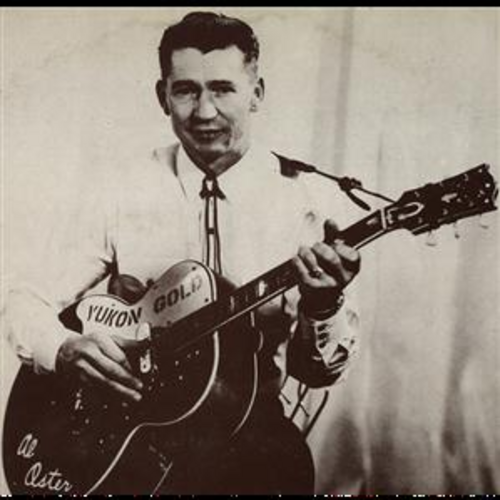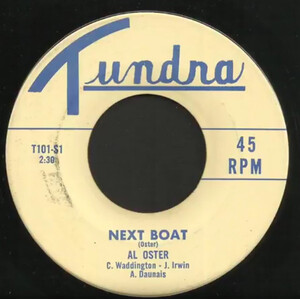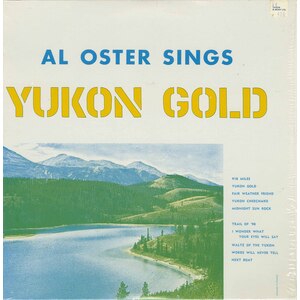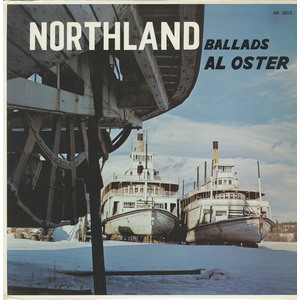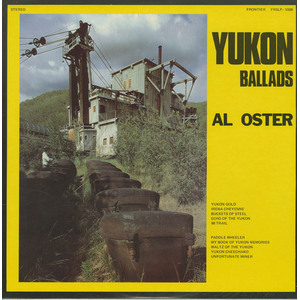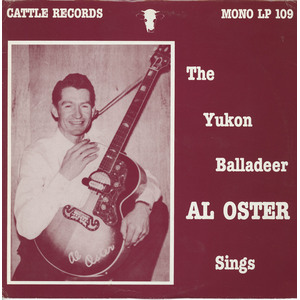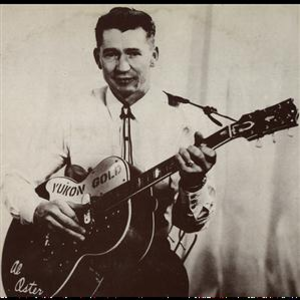Oster, Al
Websites:
No
Origin:
Vanguard, Saskatchewan - Langley, British Columbia - Whitehorse, Yukon, 🇨🇦
Biography:
Al Oster was born Albert Adam Oster on December 3, 1924, in a one-room homestead 12 miles east of Vanguard, Saskatchewan, the oldest of four sons born to John Harold and Mary (Stregger) Oster. He grew up on the wide prairie near Macoun, on a farm seven miles southwest of town, where the harsh climate and long distances fostered the self-reliance that would later define his music. His family left the drought-stricken Prairies in 1939 and moved to Langley in the Fraser Valley of British Columbia. As a young man he roamed the ranches of central B.C. and western Alberta as a singing cowboy, writing his earliest songs and performing anywhere a stage or a hayloft dance would have him. One of the country and western songs from this period, “After Tonight,” was published and recorded in the United States by Cinemart Music. He toured the B.C. interior with bands led by Mike Harris and Lynn Gibson, worked briefly with Hank Smith as lead vocalist and rhythm guitarist, and made guest appearances on Evan Kemp’s CJOR program “Buckskin Opry.” By the time he reached his early thirties, he had written dozens of songs and had already begun to see glimpses of the career that awaited him.
In 1957 Oster, his wife Mary, and their two young children, Donna and Lorne, packed their car and a small trailer and set out for Whitehorse. The trip up the Alaska Highway entered family lore, a drive through nearly fifteen hundred miles of raw country with creeks, campsites, and wilderness that left a deep impression on him. When they arrived in Whitehorse on June 27, the Midnight Sun was blazing above the Yukon River, and the spell of the North took hold. He later wrote that they had come “to the Land of the Midnight Sun,” and he meant it literally. Warm weather, endless daylight, and the enormous friendliness of the people convinced him that this was home.
Once settled, Oster worked not only as a salesman but also as a TV announcer, operator, and news anchor for WHTV, and he even hosted a half-hour music program, The Al Oster Show, which featured Yukon artists and legends and ran for three years. He wrote songs during lunch breaks, between customers, or backstage while performing at local dances. It was during one such break, sandwich in one hand and pencil in the other, that he wrote “Next Boat,” inspired by the constant sign merchants posted when waiting for crucial supplies to arrive from Skagway. “Midnight Sun Rock,” written during another short break at a dance hall, became one of the earliest and rarest Canadian rockabilly recordings, issued on the tiny Tundra T-101 label in a pressing of reportedly two hundred copies. Today it is considered a holy-grail artifact of Canadian rock history and was later reissued on international rockabilly compilations.
Recognizing the stories around him as untapped cultural gold, Oster formed Klondike Records and recorded his first LP, Yukon Gold, in 1960. He had gathered a small group of musician friends in Vancouver, recorded the songs on a Tandberg tape machine, and then converted them to a 15 IPS master for pressing at Quality Records in Toronto. The album, limited to an initial run of 1,000 copies, became a fixture in Yukon homes and tourist shops and is widely regarded as the first rock and roll album recorded in the Yukon. It also marked the beginning of his lifelong mission: to preserve northern history, characters, and legends through song.
In the following years he wrote and recorded ballads that drew on Klondike lore, Indigenous stories, Mountie tales, frontier tragedies, and contemporary events. His subjects included Soapy Smith, the notorious Alaskan con man; Norman Lee, who attempted a 200-head Klondike cattle drive; the S.S. Baychimo, the fabled ghost ship of the Arctic; old-time miners, sourdoughs, dreamers, and the riverboats that once ruled the Yukon River. Unlike the romanticized narratives found in many folk songs of the era, Oster’s lyrics were often based on interviews with old-timers, newspaper reports, and firsthand accounts, which he shaped into vivid musical storytelling.
By the early 1960s he had begun performing more widely, including a Western Canada tour with Jake Doell and The ChuckWagon Drivers on the “Yukon Gold Show,” and in 1961 he launched a three-year CBC radio series, Northland Echoes, with John Hutsul and Gerry King. He followed Yukon Gold with Northland Ballads, Northland Ballads Volume 2, and Alaska Star 49, as well as numerous singles recounting northern events such as the miraculous 49-day survival of Ralph Flores and Helen Klaben after their plane crashed in the Yukon wilderness. In 1965 he established Alkon International Inc. in the United States to distribute his recordings in Alaska and the Pacific Northwest, and the following year Canadian Music Sales issued Echo of the Yukon, a 12-song LP of his compositions. He performed a two-week stage show at Expo 67 in Montreal with Hank Karr, and CBC released the LP Yukon Stars, featuring Oster and Karr. His compositions were recorded by artists such as Harry Rusk and Jimmy Arthur Ordge, and in 1968 he received the BMI Canada Certificate of Honour for “Irena Cheyenne.”
Oster’s songs travelled far beyond the North. Stompin’ Tom Connors recorded his tune “Paddlewheeler,” German and Dutch labels reissued his rockabilly sides, and in 1981 Hank Karr recorded a full 12-song CBC LP of Oster’s material titled Paddlewheeler. In the 1970s his early Klondike LPs briefly fell out of circulation, but his catalogue continued to grow, and in the 1980s he re-recorded ten of his ballads in a 24-track studio for the LP Yukon Ballads. Labels in Germany (Cattle Records) and Holland (Collector Records) issued anthologies of his work, and in 1988 he released a 28-minute documentary film, Yukon Gold, along with a 100-page songbook containing archival photos, geographical notes, and twenty-five ballads drawn from decades of northern history.
In the years that followed he became one of the North’s most dedicated cultural ambassadors. His work received formal recognition across Canada and abroad, beginning with the BMI Certificate of Honour in 1968 and culminating in his appointment as a Member of the Order of Canada in 2000, the Queen Elizabeth II Golden Jubilee Medal in 2002, and his induction into the Rockabilly Hall of Fame in 2004 for “Midnight Sun Rock.” He also received the Yukon Heritage Award in 1993 and the Yukon Commissioner’s Public Service Award in 2006.
Even after leaving the North, Oster never severed the connection. He believed the Yukon was a place that “gets into your blood” and never lets you go. His annual returns were pilgrimages to ensure the land still lived as he remembered it, a personal reaffirmation of the landscapes and people who shaped him. Until his passing in 2017 at age 92, he continued to write, correspond, archive, and reflect on a lifetime of storytelling rooted in the frontier spirit.
Across more than sixty original northern ballads, numerous LPs released in Canada, the United States, Germany, and Belgium, and a lifetime of self-driven historical research, Al Oster preserved the characters, legends, and landscapes of the Yukon and Alaska with a dedication unmatched in Canadian folk music. He was, as many have called him, the Northland Balladeer — a songwriter who transformed the lives of miners, stampeders, dreamers, outlaws, and lonely travellers into a lasting musical record of a frontier that few understood as deeply as he did.
-Robert Williston
"I'll remember the times that I've wandered The streets of an old mining town And the romance of days gone forever That's written in the ruins lying around" "My Book of Yukon Memories"
